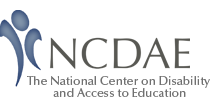Sample Language
The following are examples of language that can be used by accreditation agencies who wish to embed web accessibility into agency documents. Please feel free to use and adapt these samples as you see fit.
Diversity Statement
The agency supports and enforces equal employment and educational opportunities for all, regardless of race, ethnicity, religion, gender, national origin, disability, sexual orientation or any other significant aspects of individuals and cultural identity.
Language and Statements for use by Accreditation Agencies
Short Statement
The agency expects an institution to ensure that its environments and resources — both physical and digital — are accessible, usable, and adaptable to all students and faculty.
One Paragraph Statements
Option 1
In an age when computers and the internet are integral to higher education, the delivery of web-based information in ways that does not discriminate against individuals with disabilities is a crucial issue. If digital materials are not accessible, it affects the timeliness and quality of student engagement and negatively impacts student independence and self-determination. Moreover, ensuring that students (and others) have the same ability to take advantage of online materials and services not only addresses student needs and outcomes but also supports the core mission of most institutions and is in line with the precepts and tenets advocated by this agency.
Option 2
In an age when computers and the internet are integral to higher education, it is essential to ensure that web-based information is accessible to all — including students, faculty and staff with disabilities. If digital materials are not accessible, it affects the timeliness and quality of student engagement and negatively impacts student independence and self-determination. Moreover, exclusion and discrimination of those with disabilities is antithetical to values and missions of this agency and its constituent institutions.
Half Page Statement
The delivery of web-based information in ways that do not discriminate against individuals with disabilities is a crucial issue for institutions in a digital age. Through technology, universal design can provide equitable access to students, faculty, and staff members with disabilities. Moreover, equal access facilitates full participation in the academic experience. Ensuring that students, and others, have the same ability to take advantage of online materials and services not only address student needs but also supports the core mission of most institutions and serves society at large. It is also the law.
Student learning outcomes are strongly affected by accessibility. If students with disabilities do not have timely equal access to educational materials and processes, their outcomes will ultimately suffer. Inaccessible materials affect the timeliness and quality of student engagement in their education and negatively impacts student independence and self-determination. Furthermore, the right of faculty members with disabilities to teach, investigate, and publish freely may depend upon the issue of access.
Accessible materials can improve academic outcomes for students without disabilities as well. They can provide enhanced learning for other groups such as those who prefer multi-modal learning, or are working with older technologies, or those for whom English is a second language.
In order to be truly effective, web accessibility needs to be an institution-wide effort. The interconnected nature of the internet means that a single accessible page is worthless if one must navigate inaccessible pages to get to it. It should be noted however that an institution's efforts to improve system-wide accessibility can also provide a value-added benefit: The foundation for web accessibility is present in the existing guidelines of this agency's requirements for accreditation and may be useful in helping make your case for compliance as you prepare for reaffirmation.


